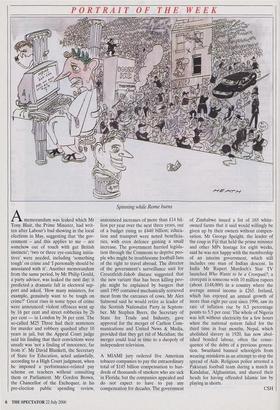PORTRAIT OF THE WEEK
Spinning while Rome burns Amemorandum was leaked which Mr Tony Blair, the Prime Minister, had writ- ten after Labour's bad showing in the local elections in May, suggesting that 'the gov- ernment – and this applies to me – are somehow out of touch with gut British instincts'; 'two or three eye-catching initia- tives' were needed, including 'something tough' on crime and '1 personally should be associated with it'. Another memorandum from the same period, by Mr Philip Gould, a party advisor, was leaked the next day; it predicted a dramatic fall in electoral sup- port and asked, 'How many ministers, for example, genuinely want to be tough on crime?' Great rises in some types of crime were announced: violent offences went up by 16 per cent and street robberies by 26 per cent — in London by 36 per cent. The so-called M25 Three had their sentences for murder and robbery quashed after 10 years in jail, but the Appeal Court judge said his finding that their convictions were unsafe was 'not a finding of innocence, far from it'. Mr David Blunkett, the Secretary of State for Education, acted unlawfully, according to a High Court judgment, when he imposed a performance-related pay scheme on teachers without consulting them or Parliament. Mr Gordon Brown, the Chancellor of the Exchequer, in his pre-election public spending review, announced increases of more than £14 bil- lion per year over the next three years, out of a budget rising to £440 billion; educa- tion and transport were noted beneficia- ries, with even defence gaining a small increase. The government hurried legisla- tion through the Commons to deprive peo- ple who might be troublesome football fans of the right to travel abroad. The director of the government's surveillance unit for Creutzfeldt-Jakob disease suggested that the new variant that has been killing peo- ple might be explained by burgers that until 1995 contained mechanically retrieved meat from the carcasses of cows. Mr Alex Salmond said he would retire as leader of the Scottish Nationalist Party in Septem- ber. Mr Stephen Byers, the Secretary of State for Trade and Industry, gave approval for the merger of Carlton Com- munications and United News & Media, provided that they get rid of Meridian; the merger could lead in time to a duopoly of independent television.
A MIAMI jury ordered five American tobacco companies to pay the extraordinary total of $145 billion compensation to hun- dreds of thousands of smokers who are sick in Florida; but the companies appealed and do not expect to have to pay any compensation for decades. The government of Zimbabwe issued a list of 165 white- owned farms that it said would willingly be given up by their owners without compen- sation. Mr George Speight, the leader of the coup in Fiji that held the prime minister and other MPs hostage for eight weeks, said he was not happy with the membership of an interim government, which still includes one man of Indian descent. In India Mr Rupert Murdoch's Star TV launched Who Wants to be a Crorepati?; a crorepati is someone with 10 million rupees (about £148,000) in a country where the average annual income is £265. Ireland, which has enjoyed an annual growth of more than eight per cent since 1996, saw its rate of inflation rise by 0.3 percentage points to 5.5 per cent. The whole of Nigeria was left without electricity for a few hours when the national system failed for the third time in four months. Nepal, which abolished slavery in 1920, has now abol- ished bonded labour, often the conse- quence of the debts of a previous genera- tion. Swaziland banned schoolgirls from wearing miniskirts in an attempt to stop the spread of Aids. Religious police arrested a Pakistani football team during a match in Kandahar, Afghanistan, and shaved their heads for having offended Islamic law by playing in shorts.
CSH


























































 Previous page
Previous page